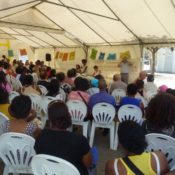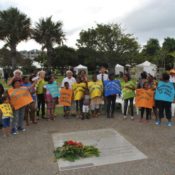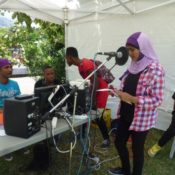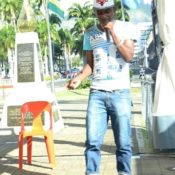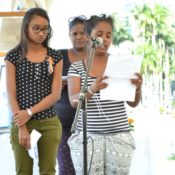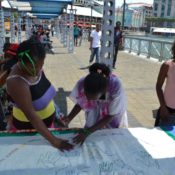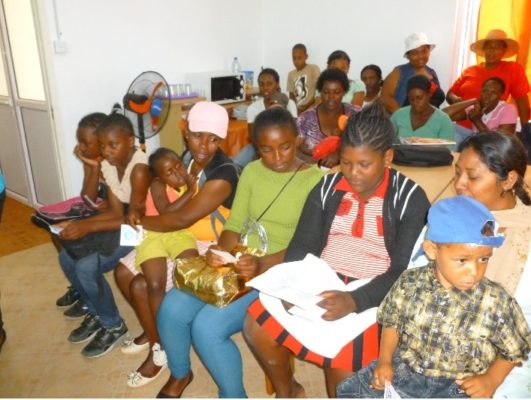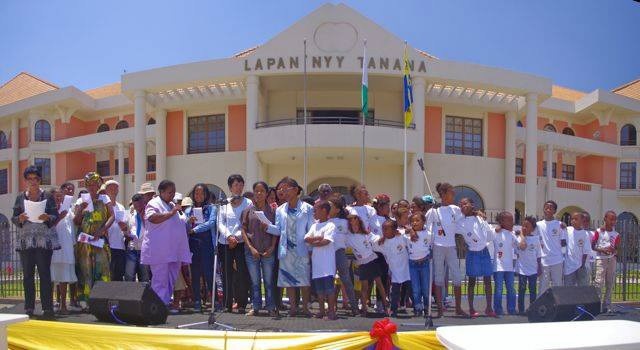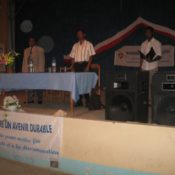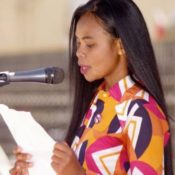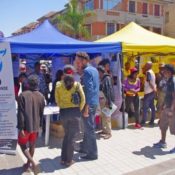Music, Art, and Economic Debates: How Four Indian Ocean Islands Marked a World Day
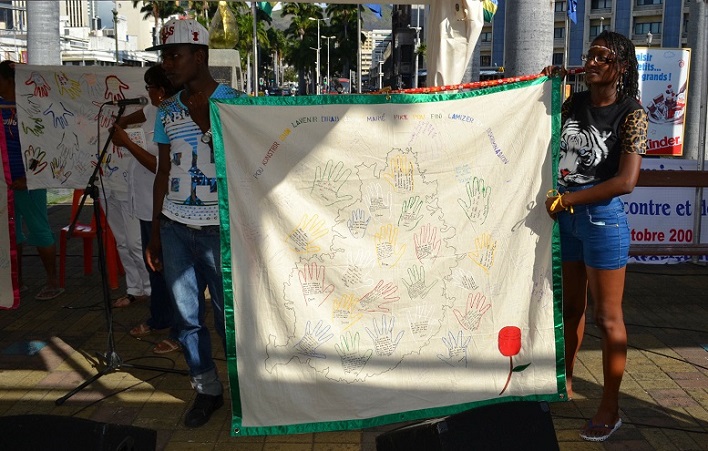
In 2015, the World Day for Overcoming Poverty (17 October) focused on the theme “Building a sustainable future by coming together to end poverty and discrimination”. Here is how it was marked on four different islands in the Indian Ocean.
Music: An island tradition
On Reunion Island,* the day revolved around the experiences and words of people who struggle against poverty every day. It included rap and musical performances by young people, as well as personal stories of struggle.
A group of local performers invited amateurs to join them on the Esplanade of Human Rights at Champ Fleuri: “Come, and speak, sing, and learn with us!” Throughout the wide green space, under baobab trees, and under tents, children and young people were invited to play guitars or percussion instruments, and listen to stories. Members of the public could also participate in the story-telling activities.
Meanwhile, more than a hundred adults took part in lively discussions. Reunion islanders of all ages, many living in difficult situations, were able not only to hear musicians sing, but also to talk with them about their art.
In the tent set aside for discussions, the question of young people’s education and future was a popular topic. Ideas were also exchanged about plants, nutrition, and nature preservation.
In the afternoon, the participants — including several distinguished guests — came together around a commemorative stone honoring the victims of extreme poverty. Messages from Mauritius, Mayotte, and China were read, as was a collaborative testimony written by people from different parts of Reunion.


Play with YouTube
By clicking on the video you accept that YouTube drop its cookies on your browser.
The day was made possible through the joint efforts of eleven organizations that work in different areas, with technical support from the city of Saint Denis, and backing from local and international media.
Mauritius: “A more humane economy focusing on people”
On Mauritius Island, the World Day was organized by the Committee for October 17th (a collective of several non-profits), which brought together families from all over the island and prepared testimonies with people who live in poverty, including people who live in a shelter run by Caritas. Also, Angela and Sybille, members of ATD, read a message from people in their Anoska and Richelieu communities.
Many young people worked hard to prepare the event. During the day, they invited the public to write a message on top of a hand, drawn on canvas. The messages include the following:
- “The hand is important for work.”
- “I was born in poverty, and I’m glad to be able to show solidarity from my own experience.”
- “Wherever there is deep poverty and violence, there are people who are forced to leave their homes and live in the street. Sometimes there are mothers who abandon their children. They feel destroyed, forsaken.”
Ms Tillie Evenor, vice president of ATD Fourth World–Mauritius, opened the day and introduced Mr Casssam Uteem, who said, “If we want to respect people who endure poverty, we must begin by respecting how they live.”
An interfaith group read a text written by Joseph Wresinski in 1987, called “Verses to the Glory of the Fourth World”. The singer Jasmine Toulose and her group gave a performance to end the day.
Read the testimony of the families from Anoska (in French).
An exhibition on the island of Rodrigues: The “Letter to Friends” in Living Colour
On Rodrigues, an island east of Mauritius,** the 17th of October was commemorated by displaying the exhibition “The ‘Letter to Friends’ in Living Colour”. Among the guests were members of a committee that helps children of low-income families to go to school.
“We formed an association in St Gabriel to grow coffee together. It’s working well, and for it to continue to work well, there must be trust among us.”
“Many children come to school hungry because there isn’t enough money at home, and so they have difficulty learning. We created a small group to enable these children to have a meal at school.”
This support for the children created a link with their families in other areas of their lives: housing, work, education, training, culture, and friendship. It also created connections between the families who help each other and make sure no one is left isolated.
Madagascar: Debates and information on job training
In the city of Toliara, the October 17th commemoration was held in the Basia Cultural Centre . It included personal messages read aloud and a conference chaired by Mr Dimby Vaovolo, a university professor, which focused on the anti-discrimination theme of the day.
In the city of Antananarivo, a ceremony took place on the central square where a delegation of children, young people, and adults addressed participants. The president of ATD and a representative of the Minister for Population gave speeches, which were followed by dances and songs.
Three mini-forums were organized over 16 and 17 October on the themes of access to health care, education, and job training. Three professional interpreters volunteered their time to allow foreigners present to follow the discussions.
Ten associations maintained information booths on the same two days. A coalition for the Development of Technical and Professional Competence supported the participation of organisations that promote access to decent employment for people in poverty. The Ecole Normale Supérieure and other universities also took part in the events.
* Réunion Island is located in the Indian Ocean, between the nations of Madagascar and Mauritius. This island is part of France.
** Rodrigues is an autonomous district that is also part of the Republic of Mauritius.



